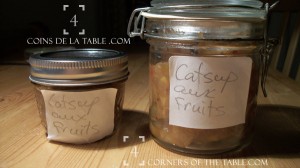In Quebec the tourtière keeps its noble place on tables during the Réveillon or Christmas Eve. My family, which left Quebec 30 years ago for British Columbia still eats tourtière at Christmas too. If you do not know what the tourtière is, for many it is a meat pie with or without potatoes, […]
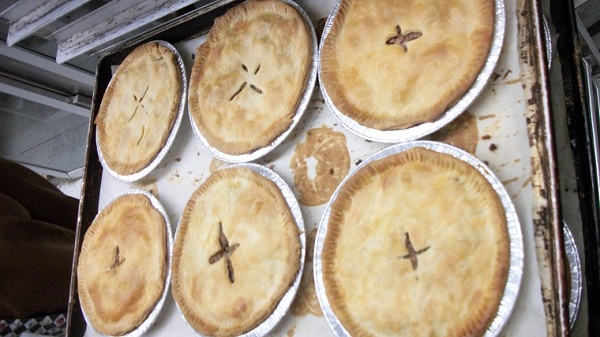
Tourtières fresh out of the oven- meat pie style
In Quebec the tourtière keeps its noble place on tables during the Réveillon or Christmas Eve. My family, which left Quebec 30 years ago for British Columbia still eats tourtière at Christmas too. If you do not know what the tourtière is, for many it is a meat pie with or without potatoes, but in Lac-St-Jean and Gaspésie it is a deep dish mix of meats covered with dough.
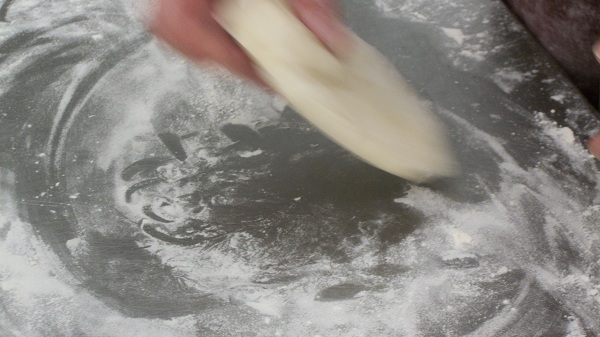
Scraping dough off the table
On November 20th I went to Aux Purs Délices the pastry shop on Church Street in Verdun to participate in the Réseau d’Entraide de Verdun bi-annual tourtière making day. Mr. L’Anglais generously leaves us his bakery and supplies with the boxes, aluminum pie trays, the use of his ovens and rolling pins to make the pies. The tourtière are sold for $3.00 each and are very popular at Christmas time. We make tourtières to fund my cooking workshops amongst other activities. Making them is a lively gig where one group of volunteers does the morning shift and another group the afternoon shift. The volunteers are put in different modes of production: most roll tops and bottoms, while others fill the pies, cover them, cut an “X” and brush the tops with egg wash, and others still fill the speed rack and the ovens. We get to taste the shop’s delicious pastries. The radio plays and we sing along with music from the 70’s and 80’s. You will hear comments like “C’est Richard Seguin qui chante ça. J’y ferais pas mal. Je passerai mes mains dans ses cheveux.” There’s a lot of fooling around, but we also manage to pump out about 400 tourtière’s in a day thanks to the energy of the volunteers, the rotating oven that fits 72 tourtière s at a time and because of the sheer love for tourtière.
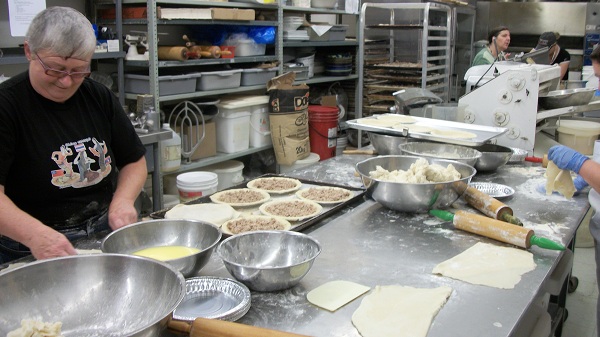
- Production at Aux Purs Delices
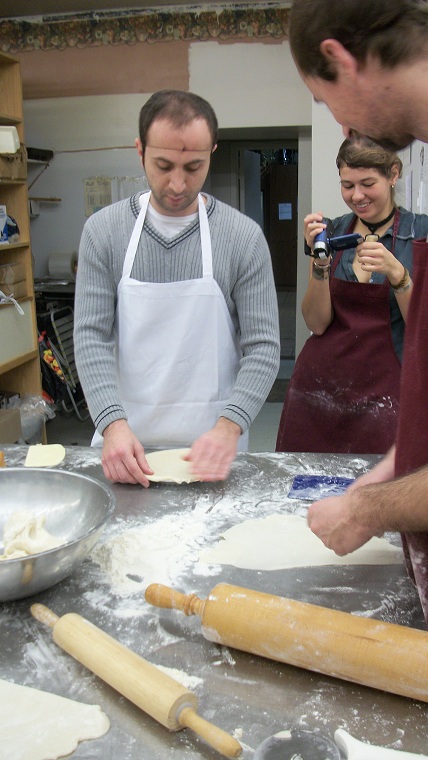
Working the dough
While I was doing research for a contract the same week, I stumbled on “The Long History of Tourtière of Quebec’s Lac-St-Jean” by Jean-Pierre Lemasson in What’s to Eat: Entrées in Canadian Food History, Edited by Nathalie Cooke. It turns out that tourtière may have come from tourterelle or turtle dove pie. It may also have come from the name of the dish tourtière that it was cooked in, but the first recorded tourtière -like recipe dates back to 1600 B.C. Mesopotamia. It instructs to boil gizzards and intestines with aromatic bark, salt, fat and rue. It uses onion, samidu (an unknown spice from Mesopotamia), leek, garlic, sasku semolina and milk for the dough, and of course, poultry.
In 400 AD there is a version made with tripe, lovage, eggs and wheat flour.
There is also the Cipaille or Cipâte in Gaspésie whose ancestors are the Sea Pie, Cipaye, Cipare, Six pâtes (6 doughs), six pailles (six straws). This traditionally had 6 layers, but it has ebbed into something made with what people have: traditionally pork and veal. The tourtière has become a meat pie for those outside of Lac-St-Jean. In the Middle Ages, however, the six layers included:
1) Fried chicken with onions and spices
2) White and Green (parsley) ravioli
3) Sausage, minced meat and ham
4) Minced pork with cheese and eggs
5) Sausage, brain, marrow, cheese and herbs
6) Ravioli with almonds, half of them sweetened with sugar
Between each layer there were stuffed dates and eggs. Sounds like an Epic Meal Time feat to me. This was the decadent version, but the beauty of the meat pie is that it cuts across class lines because you can use what you have. For the Réseau d’Entraide’s we used ground pork that had been donated and the dough from Aux Purs Délices. The pies are humble, but delicious and they are at a price that is affordable to all, even those with the least and they help to finance food security measures, food hampers, collective kitchen groups and cooking workshops that give people the culinary tools to save money, eat better and build autonomy.
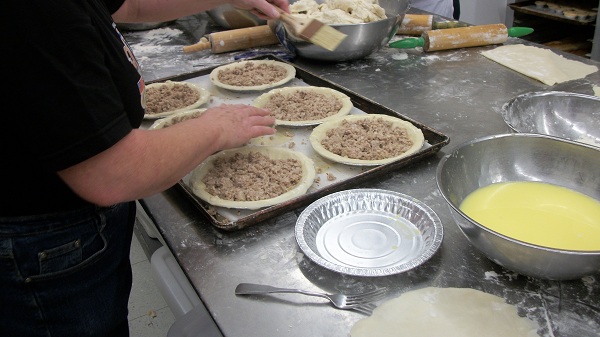
Getting ready for the Tops Tops on- Check- ready for trimming and grooming.
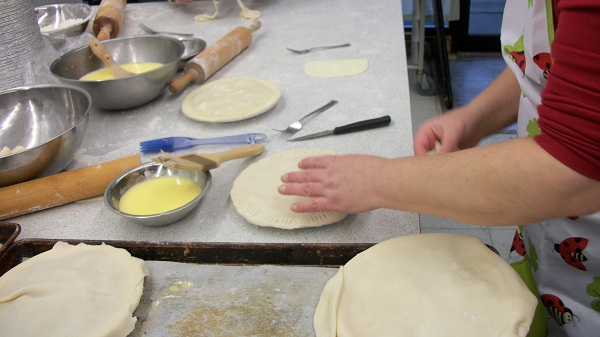
Finishing Touches
Charlevoix and Lac-St-Jean both claim to be the home of the real tourtière. My Simard ancestors first landed in Charlevoix, but then many Simard’s moved to Lac-St-Jean. Maybe the tourtière had a similar story. The tourtières roots run much deeper than that thought. Meat pies are one of the earliest recipes known to man. There are versions throughout Europe, the Middle East and the Slavic countries. They have been exported around the world (patties, empanadas)- everyone has a version. Maybe that explains the deep nostalgia we feel when we eat tourtière at Christmas. The feeling is deeper than Quebec pride, it is engrained on our genes and a symbol of survival, movement around the planet and baking our own version of “abundance” . Companion means “bread sharer” in Latin, so as soon as you have the crust holding everything together, you have a real party and coming together.
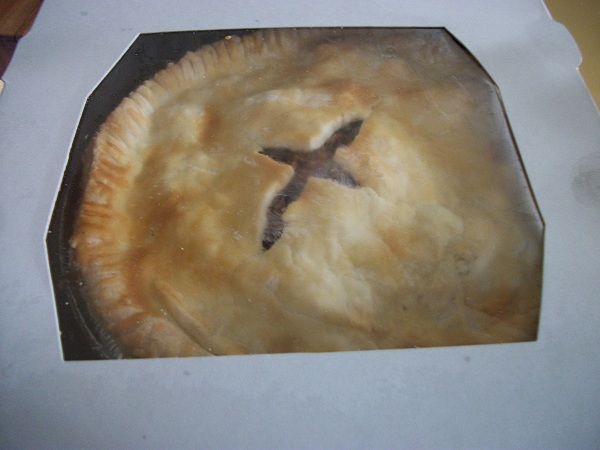
Party in a Box for $3.00
Challenge: I challenge you to make your own meat pie with as many layers as you see fit, that represents who you are, your social strata and your genetic evolution.
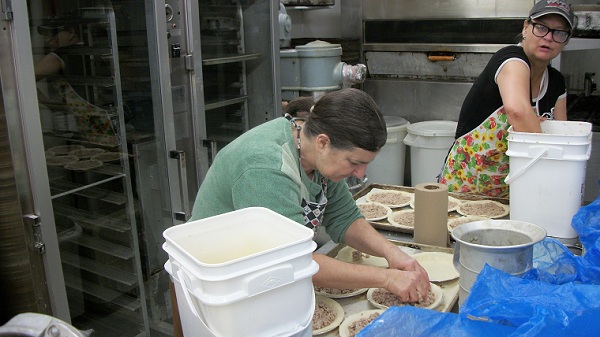
Toutière Enthusiasts
For more info about tourtière click here:
If you want to see my recipe for Catsup aux Fruits which is great with tourtière click the photo below
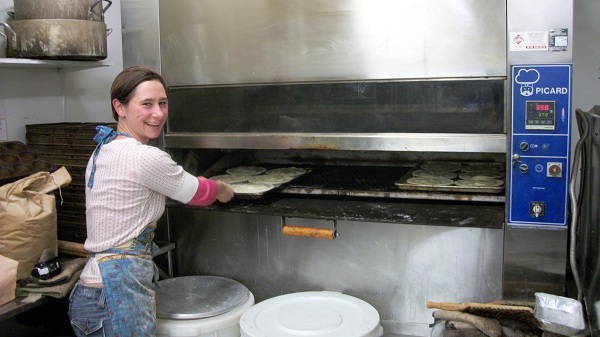
Convection oven with Rotating Racks- We baked 72 tourtière at a time- 144 if we wanted to.
CATEGORIES
Archives
- February 2022 (1)
- October 2020 (2)
- September 2020 (1)
- January 2016 (1)
- January 2015 (1)
- October 2014 (1)
- February 2014 (1)
- January 2014 (1)
- July 2013 (1)
- June 2013 (2)
- May 2013 (1)
- March 2013 (1)
- February 2013 (2)
- November 2012 (1)
- September 2012 (1)
- June 2012 (2)
- May 2012 (1)
- April 2012 (1)
- March 2012 (1)
- February 2012 (1)
- January 2012 (2)
- December 2011 (1)
- November 2011 (4)
- October 2011 (4)
Popular Tags
'Round Table Tours Asian breakfast business prolfiles cabbage canning Community Europe Events farms fermentation Fitz & Follwell Food & Story Food history Food Production food tours fresh juices Friends gastronomy health herbs History Italy kimchi Meal exchange Nuart organic preserves public Quebec restaurant Rumble & Shakes Réseau d`Entraide de Verdun salt smoothies spicy Tours de la Table Vegan youtube videos

